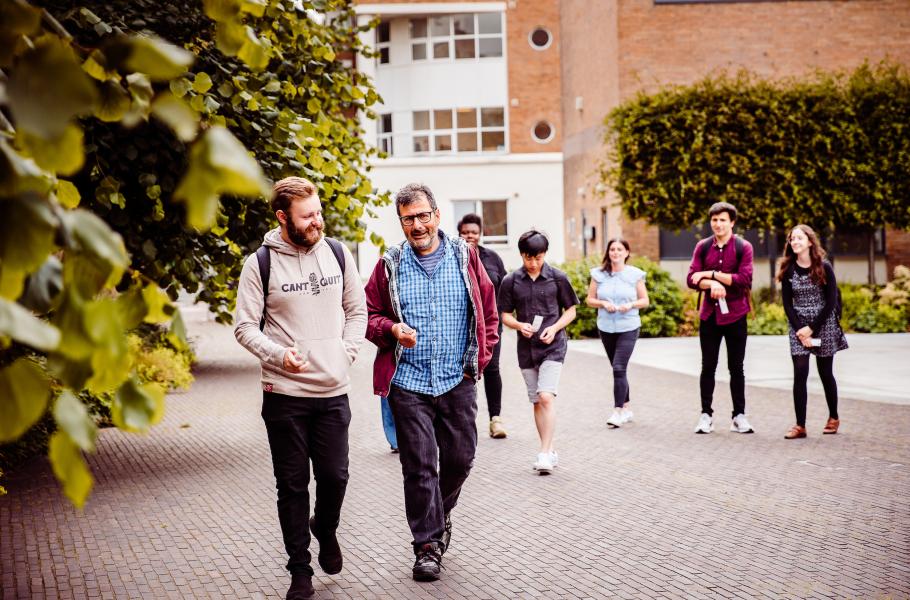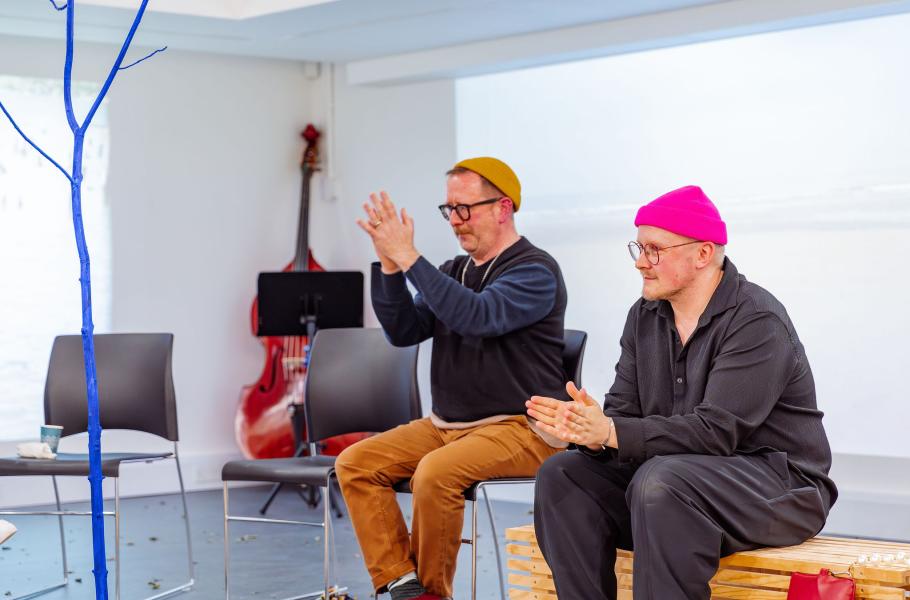The Body as Data: Reflections on my Art and Data Residency at Lancaster Arts
In January 2024, artist Jenni Jackson took part in our Art and Data residency, alongside artist Stevie Ronnie. This week-long opportunity was a chance for the two artists to think and experiment with academics working with data at Lancaster University. Alongside the residency, Lancaster Arts brought together artists, academics and other data users together in a Creative Gathering, to broaden our thinking around the potential of data and art to shed light on and humanise some of the key social justice issues of our time. More on the residency and some poetic reflections from Stevie Ronnie can be found here.
Jenni worked with academics Michaela Benson (Public Sociology), Heather Brown (Data Science Institute – Health), and Anastasia Ushakova (Biostatistics). Here Jenni explores her experience of the residency:
I came to this residency with an interest in the ways that data, and the arts could speak to each other. I am particularly interested in the ways that data can be used to support social justice, and the ways in which it can be used to hinder the progression of human rights. I make work that looks at the ways women and girls use their bodies, and the experiences of living between cultures as a person with mixed heritage.
A lot of my work deals with the body, and the information that it holds. I have made work where this is expressed through movement, content, through the interpretation of biometric data in a performance space, and through narrative and form.
I had no idea what to expect when I began talking to the academics at Lancaster. I came away with the feeling that we are all trying to drive towards a more equitable and fairer society through our professional endeavours. I liked that a lot. If the job of the artist is to make the invisible, visible, then the academics I met were doing this. By looking at some of the ways that injustice and inequality prevail through our society, their data (hopefully) becomes part of a conversation to affect policy change.
I heard about data points, and shadows of lives that lie behind these. I learned about the way data is measured and the people who are at the edges of the curve. I learned about the way the Home Office was being asked to qualify, and therefore be able to identify, 'true love'. I thought about the messiness of being a human, and about living and raising families across borders, and I felt overwhelmed by the sheer scale of it all. So. much. data.
I mean, we are taking in data all the time. Every day.
We give off information all the time. Every day.
I thought about my Fitbit, measuring my heart rate, all the time. Every day.
For what? Why?
What do we do with all this data?
We learn. And maybe this will help us understand why. And then, maybe we can see that there is more that connects us than divides us. And maybe then, we can find a connection. Empathy. And that's what I do, when I bring people together to experience something, together. It feels a bit naive when I write it like this, but it's true. What is the 'invisible' I am making 'visible' and why?
That's the start of the making process for me.

I spent time with Stevie Ronnie (the other artist in residence), talking about our practices, and eating together. There was space to share thoughts, and experiences, and I learned about his visual arts practice and his poetry. I thought about simplicity a lot in these conversations, about distilling ideas and thought about how data is the distillation of information into something measurable.
During the week I spent some time in the familiar space of being in a studio, and not knowing what to do, or how to begin.
It's a space I find myself regularly, and I often have a huge surge of imposter syndrome. I end up putting on some music, warming myself up, and waiting for something to enter. It takes patience, and time, because sometimes nothing enters, and other times there are too many thoughts, and other times, the ideas come when you have three minutes to leave the space before the duty manager locks up. Inspiration can be inconvenient.
This time, I sat down in the space and thought about all the spaces in the country where artists sit, waiting for something to enter. The [Nuffield] theatre is a great size, it has width and depth and height, it reminds me of some of the spaces I have visited in Ghent and Brussels – an invitation to make something happen. Something that can only happen in a space like this.
Midway through the week, we were part of a creative gathering, where artists, academics and others interested in data attended and we shared practice, thoughts and conversation. It was a space to open up these conversations to people who don't make [art] work in the way that I do. I was humbled by the knowledge and care in the room. I played with my heartbeat as a data point, something I have been exploring with the company idontloveyouanymore (who incidentally studied at Lancaster University).
I thought about all the conversations I’d had, about data as shadows of humans, about the people at the edges of the data graphs, and about how humans can be reduced to something measurable, codified and quantifiable. That there are lives under all that information, and the ways in which data can be used to progress social justice or used to control and oppress people. I wondered about how we instinctively construct story and meaning from data, but that it may not reflect the original source.
I thought about my conversation with academic Michaela [Benson], about the Home Office, and the lives affected by the decisions made there. I thought about my own story. I often start at a place of autobiography with my work, as I play with the material of my life, a fiction almost. Part of my story is linked to Lunar House and my mum can still recite the full address, years later. Michaela mentioned that the name of Lunar House crops up in many studies. It's unsurprisingly a source of much trauma and distress. I thought about this a lot.
I found a video someone had made of the journey from Euston to Lunar House. We will have made this exact journey many times as a family. From that piece of found footage, I started something. And [artist and documenter] Lowri Evans has captured some of the events of this early experiment in her documentation of the residency sharing here. I wore a red dress, bounced [on a trampette], played with classical movement (such as ballet) and talked about the etymology of the building that houses the Home Office. There is something in it, I think. I recognise that this 'something' that is every day, and part of my history. It resonates and feels bigger somehow. It's vibrating and speaking to my big questions about diaspora, identity, belonging, and the power structures that play out in our everyday lives. They are moments experienced by individuals that somehow also contain the patterns of power struggles that have been playing out over millennia. That felt exciting. To feel that little spark of an idea, a form, a question.

Jenni is a Latinx Anglo-Bolivian artist, based in Manchester, and her performances encompass contemporary dance, folk dance, theatre, live art, martial arts, co-creation and the excitement of a sports spectacle. Her work has received support and from the Jerwood Live Work Fund, Jerwood New Work Fund, Arts Council England, MGCFutures, Barbican Open Lab, and she has been a resident artist at The Lowry/The Place for her choreographic research idea THANK HEAVEN FOR LITTLE GRRRLS ( a dance theatre work for a cast of 10 year old girls, who build an edifice with power tools, live and in real time).




